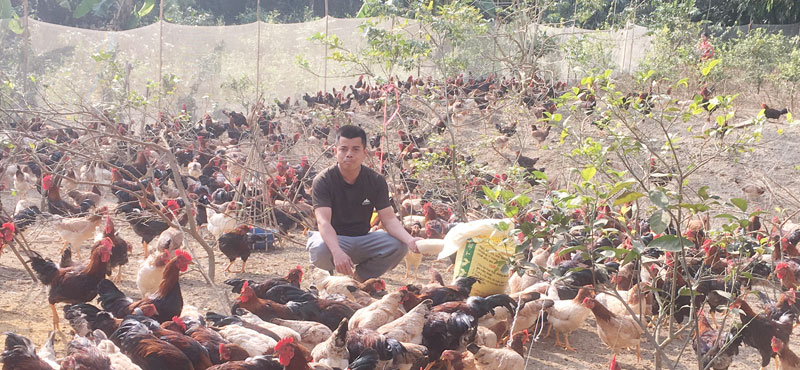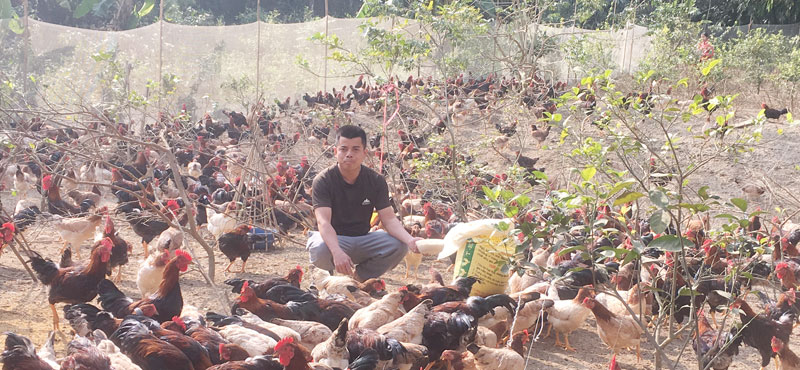
(HBO) – Mr. Nguyen Van Quan, (born in 1981), in Dong De hamlet, Dong Tam commune in Lac Thuy district, made a brave decision to invest in large-scale poultry raising three years ago.

Nguyen Van Quan, Dong De hamlet, Dong Tam commune in Lac Thuy district,
is the owner of a chicken farm model meeting food safety standards. He sells around
2,000 commercial chickens per brood to the
market.
Quan said he has accumulated many
experiences after nearly 20 years raising chickens, which helped him minimize risks
when investing in large-scale breeding.
Taking advantage of a large area of hill
land of his family, he built a solid farm with a fence system surrounding
for raising free-range chicken.
Quan chose Lac Thuy
chicken, which has good meat quality, for his farm.
Deciding to follow the
direction of safe husbandry, he mainly uses
natural food for the chickens. When the chicks are small, he feeds them bran but
when they reach the weight of 0.4 -0.5kg per head, he feeds them entirely with corn
and rice.
Quan also pays special attention to preventing diseases, particularly regular
checks and vaccination for chickens, and sanitation, detoxification and
disinfection for the facilities.
He rakes in big profits from the farm especially on the occasion of Lunar New
Year (Tet) festival because of great demand in the market and high prices.
In the 2018 Lunar New Year festival, the price for his chickens stood at 100,000
VND/kg, up 20,000/kg compared to normal days, helping him earn 130 million VND in
profit.
Quan’s farm raises three broods of
chickens a year, selling 2,000-2,500 commercial chickens each brood and earning
around 400 million VND a year.
Quan said he had linked up with many traders from other provinces, and his
products are mainly sold in wholesale markets in Hanoi.
Apart from breeding chickens, Quan takes advantage of the hill and mountainous terrain
in his farm to raise fish and goats. Feed for goats and fish all comes from
available natural resources. Quan said he raked in a combined profit of
over 500 million VND per year from raising chickens, goats and fish. He also
revealed his plan to increase the number of chicken to 3,000 per brood in the
coming time./.
According to data from the Hoa Binh Provincial Party Committee, the industrial production index for the first six months of 2025 is estimated to have increased by 20% compared to the same period last year. This marks the highest year-on-year growth rate for this period since 2020.
In the first six months of 2025, Hoa Binh province’s export turnover was estimated at 1.145 billion USD, marking an 18.11% increase compared to the same period in 2024. Import turnover was estimated at $ 804 million, a 17.15% increase, which helped the province maintain a positive trade balance.
The lives of the ethnic minority farmers in Tan Lac district have gradually improved thanks to the new directions in agricultural production. This is a testament to the collective strength fostered through the professional associations and groups implemented by various levels of the district’s Farmers’ Union.
With the motto the "product quality comes first,” after nearly one year of establishment and operation, Muong village’s Clean Food Agricultural and Commercial Cooperative, located in Cau Hamlet, Hung Son Commune (Kim Boi district), has launched reputable, high-quality agricultural products to the market that are well-received by consumers. The products such as Muong village’s pork sausage, salt-cured chicken, and salt-cured pork hocks have gradually carved out a place in the market and they are on the path to obtaining the OCOP certification.
In the past, the phrase "bumper harvest, rock-bottom prices" was a familiar refrain for Vietnamese farmers engaged in fragmented, small-scale agriculture. But today, a new spirit is emerging across rural areas of Hoa Binh province - one of collaboration, organisation, and collective economic models that provide a stable foundation for production.
Maintaining growing area codes and packing facility codes in accordance with regulations is a mandatory requirement for agricultural products to be eligible for export. Recently, the Department of Agriculture and Environment of Hoa Binh province has intensified technical supervision of designated farming areas and packing facilities to safeguard the "green passport" that enables its products to access international markets.



